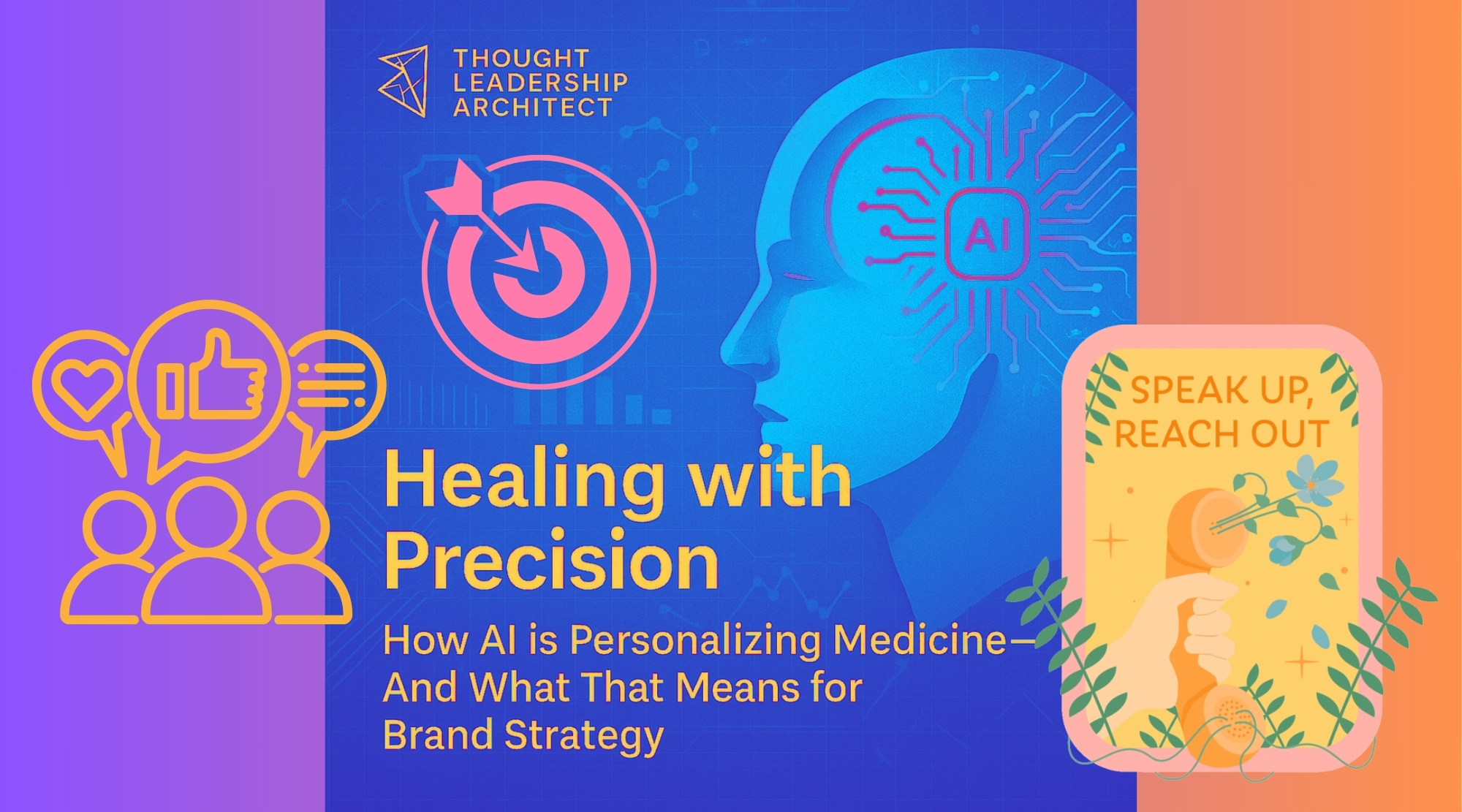The future of medicine is not one-size-fits-all. It’s customized, data-driven, and delivered with pinpoint accuracy. As AI-powered precision medicine reshapes diagnosis and treatment, it’s also rewriting the rules for healthcare branding and communication.
If patients now expect personalized care, they’ll also expect personalized messages. In 2025 and beyond, the health companies that win trust and loyalty will be the ones that align clinical precision with communication precision—driven by AI.

What Is Precision Medicine—and Why Is AI Critical?
Precision medicine refers to treatments tailored to an individual’s genetics, lifestyle, environment, and clinical history. Instead of treating a disease based on the average patient, clinicians use AI to understand what will work for this patient at this time.
Examples of AI in Precision Medicine:
- Genomic analysis to identify cancer risks and drug sensitivities
- Predictive algorithms that forecast heart attack likelihood
- Digital twins of patient physiology for personalized treatment modeling
- Natural Language Processing (NLP) that turns messy clinical notes into tailored treatment options
“AI transforms oceans of patient data into actionable insight,” says Dr. Mira Salim, Director of Computational Medicine at HelixPath Labs. “It allows us to move from generalized treatment to individualized healing.”
The Patient Experience Is Now Hyper-Personal
Patients don’t just notice personalized care—they expect it:
- They want treatment plans that reflect their history and risk profile.
- They expect communication that mirrors their values, language, and lifestyle.
- They demand digital tools that remember them—and evolve with them.
According to a 2025 Deloitte Health Consumer Study, *78% of patients are more likely to stay loyal to a healthcare provider that offers personalized digital experiences.*¹
That includes messaging. A patient who receives a targeted cancer therapy based on her genetic profile will expect equally tailored communication from your organization—both clinically and emotionally.

Brand Strategy in the Age of Precision
Here’s the shift: precision medicine isn’t just a clinical innovation. It’s a brand expectation.
Your company’s voice, outreach, and reputation must now evolve in tandem with personalized care.
Key Brand Strategy Adaptations:
1. Hyper-Targeted Messaging
Use AI to segment audiences not just by age or condition, but by biomarkers, treatment history, communication style, and risk tolerance.
2. Trust-Centric Content
Precision medicine often involves complex technologies. Use content to educate patients transparently, with clarity and empathy, not hype.
3. Multi-Modal Communication
Deliver content where patients are: mobile apps, email, portals, social, and even voice-based AI assistants—all tuned to the patient’s preferences.
4. Genomics-Informed Brand Personas
For pharma and biotech firms, patient personas must include genomics, diversity in drug metabolism, and lifestyle data—not just basic demographics.
Real-World Example: AI Meets Oncology and Outreach
At the Summit Oncology Group, patients undergoing personalized cancer treatment receive AI-generated education packets tailored to:
- Their genetic mutation (e.g., BRCA1 or KRAS status)
- The stage of their treatment (pre-chemo, remission, etc.)
- Their preferred learning style (visual infographics vs. plain-text FAQs)
“We used to send out one generic brochure to all patients,” says Sarah Elwood, Director of Patient Engagement. “Now, our AI system delivers 12 different versions—each speaking directly to that patient’s journey. It changed everything.”
The result? Higher treatment adherence, better comprehension, and a 19% boost in NPS (Net Promoter Score) in just six months.²
What This Means for Marketers, Brands & Thought Leaders
Healthcare marketing used to rely on mass media and broad messaging. That era is over.
In its place?
A precision brand ecosystem that speaks to micro-audiences with macro trust.
This means:
- Using AI-driven content personalization at scale
- Incorporating predictive patient behavior modeling
- Shifting from brand awareness to brand intimacy and trust
- Partnering with clinical teams to co-create messaging that reflects clinical accuracy and emotional clarity
“Patients won’t separate your medicine from your message,” says Jamie Choi, VP of Strategy at HealthBrand AI. “If your treatment is personalized but your outreach isn’t, you’ve broken trust.”

Tools to Bridge Clinical Precision and Brand Precision
✅ Custom GPTs for Patient-Facing Content
Train LLMs (like GPT-4) on your company’s treatment guidelines, tone, and FAQs to generate content that’s medically accurate and patient-friendly.
✅ Behavioral AI Engines
Predict when a patient is likely to lapse in care—and proactively reach out with helpful nudges.
✅ Multilingual AI
Use generative tools to translate nuanced care messages into culturally relevant formats—particularly important in global pharma and health orgs.
✅ Sentiment Analysis
Analyze patient feedback across channels to refine tone, clarity, and engagement strategies.
Challenges to Navigate
Even as AI opens powerful doors, healthcare leaders must remain vigilant:
- Privacy risks in using behavioral and genomic data for marketing
- Bias in AI models that may misrepresent or exclude certain populations
- Over-automation that risks sounding robotic or impersonal
“Precision should never mean impersonal,” warns Dr. Omar Castillo, a medical ethicist at Stanford BioDesign. “AI is the tool—but human empathy remains the brand.”
Roadmap: Evolving Your Brand for Precision Medicine
- Align your brand team with your clinical innovation team.
Messaging should reflect the sophistication of your science. - Build patient journeys that reflect the full spectrum of precision care.
From testing to diagnosis to follow-up support—every touchpoint matters. - Audit your content library.
Is it still written for the average patient—or the individual? - Train your AI tools wisely.
Use brand-safe, medically vetted content when training GPTs and automation tools. - Invest in data governance and trust.
If patients suspect you’re misusing their data, you lose not just compliance—but credibility.
What’s Next? The Rise of Precision Trust™
Just as AI can personalize healing, it can also personalize trust-building.
Imagine:
- A chatbot that knows not only a patient’s next appointment—but their fears and health literacy level
- A pharma brand that sends encouragement messages timed to a patient’s treatment side effect window
- A health system whose messaging evolves as the patient recovers, relapses, or re-engages
This is Precision Trust™—and it’s the future of patient-centered branding.
Bibliography
- Deloitte Health. 2025 Consumer Experience Study: Personalization in Care.
- Summit Oncology Group. Internal Patient Engagement Performance Report. (Q1 2025)
- Choi, J. (2025). Interview at AI & Brand Symposium.
- Castillo, O. (2024). Ethics in Precision Healthcare. Stanford BioDesign Journal.
- HealthBrand AI. AI Tools for Personalized Healthcare Marketing. (2024)
#PrecisionMedicine #AIinHealthcare #HealthcareMarketing #PersonalizedMedicine #CustomGPT #HealthEquity #PatientEngagement #MedTechStrategy #ThoughtLeadership #BrandTrust #DigitalHealth



Leave a Reply